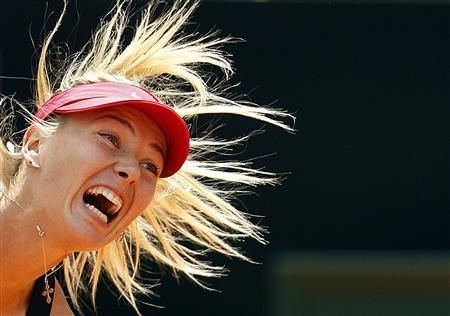Is The ‘Tennis Grunting Ban’ Maria Sharapova Supports Sexist? [VIDEO]

Women’s tennis is nearly synonymous with grunting, but after a new ban by the Women’s Tennis Association, grunting may be no more. Maria Sharapova, one of tennis’ infamous "grunters," supports the idea -- but is this just another way to shut women up or control their bodies?
The Women’s Tennis Association wants to encourage future players to turn down their volume under pressure from fans, broadcasters and some players who were fed up with the constant shrieking on the court, Reuters reported.
Sharapova, who supports the ban, is one of tennis’ biggest “grunt” offenders, with her screeches being measured more than 101 decibels, comparable to a chain saw, a pneumatic drill or a speeding train.
The WTA is going as far as having referees “armed” with hand-held devices to measure the noises the athletes make on the court. Lower-tier tournaments have already begun to educate tennis players at major tennis academies.
"Bottom line is the right answer has been taken by the tour," Sharapova told Reuters, knowing she will not have to monitor her own yelps.
"I started grunting since whenever I can remember," she added at the Pan Pacific Open in Tokyo. "I see videos of myself and I've grunted for that long. Nobody told me to do it in Russia or in Florida. It's just a natural habit."
Grunting has always been a topic for discussion in tennis, but it recently made headlines when Belarusian Victoria Azarenka and Sharapova shrieked their way into the first two grand slam titles this year.
"The information going towards coaches and academies that are developing talent from a young age is teaching them a certain breathing technique," said Sharapova.
"Because when you start something from a young age and continue it, it's a habit - whether you do grunt or don't grunt.
"The WTA created a plan. That's the smart way to go about it, rather than like taking someone's forehand and grip in the middle of their career and telling them to change it."
Nine-time Wimbledon singles champion Martina Navratilova referred to grunting as "cheating, pure and simple" and wants the rule changed as soon as possible.
Coach Nick Bollettieri has been accused of teaching his players to grunt as a distraction, though he vehemently denies the claim.
Sharapova said it best herself. Grunting is a “natural habit.” Why should female athletes have to learn how to breathe differently if it’s something that comes naturally to them and doesn’t harm them or their opponents?
Though players like Navratilova have referred to it as cheating, there are no rules stopping her from grunting if that’s a type of offense she would like to play.
Having the umpires on the court with hand-held devices measuring the noise that the athletes make while they are playing tennis is just plain ridiculous. No one would ever think to bring a such an instrument to a football or hockey game and monitor the players' volume.
Don’t roll your eyes just yet because hockey and football were compared to tennis. Yes, they are full-contact sports, but the bottom line is that during sports the body is still exerting energy. If when a female body exerts energy it comes out in the form of a grunt, so what?
The Business Insider's Tony Manfred, who wrote, “No, Wanting Women's Tennis Players To Stop Screaming All The Time Doesn't Make You Sexist,” feels quite differently:
“Male and female tennis players don’t grunt with equal frequency and vigor,” Manfred writes. “The grunts in women’s tennis … aren't the result of intense physical exertion over a long period of time.” Instead, they represent “a superficial, ear-splitting tactic used for a variety of reasons.”
That could be a possibility, but who's to say that male athletes constantly adjusting their jock straps or slapping each other's behinds isn't distracting?
But let's get down to the real reason why grunting in women's tennis is even a topic of discussion: When women make noises on the court, their moaning sounds like they're having sex and are similarly reminiscent of giving birth.
Such sounds belong in the bedroom, but not on the court because they are primal, animalistic -- not ladylike, some think.
Women aren't prim and proper 100 percent of the time, and they shouldn't have to be. Teaching a female to stifle groaning while exerting energy is similar to putting her body in a corset.
Surely, she can learn to breathe differently and her waist is smaller, but it certainly isn’t natural. She looks more appealing that way, much as she will seem more ladylike when she is playing on the tennis court, not grunting.
Women grunt in tennis for a reason, and those it makes uncomfortable just shouldn't watch.
© Copyright IBTimes 2025. All rights reserved.






















